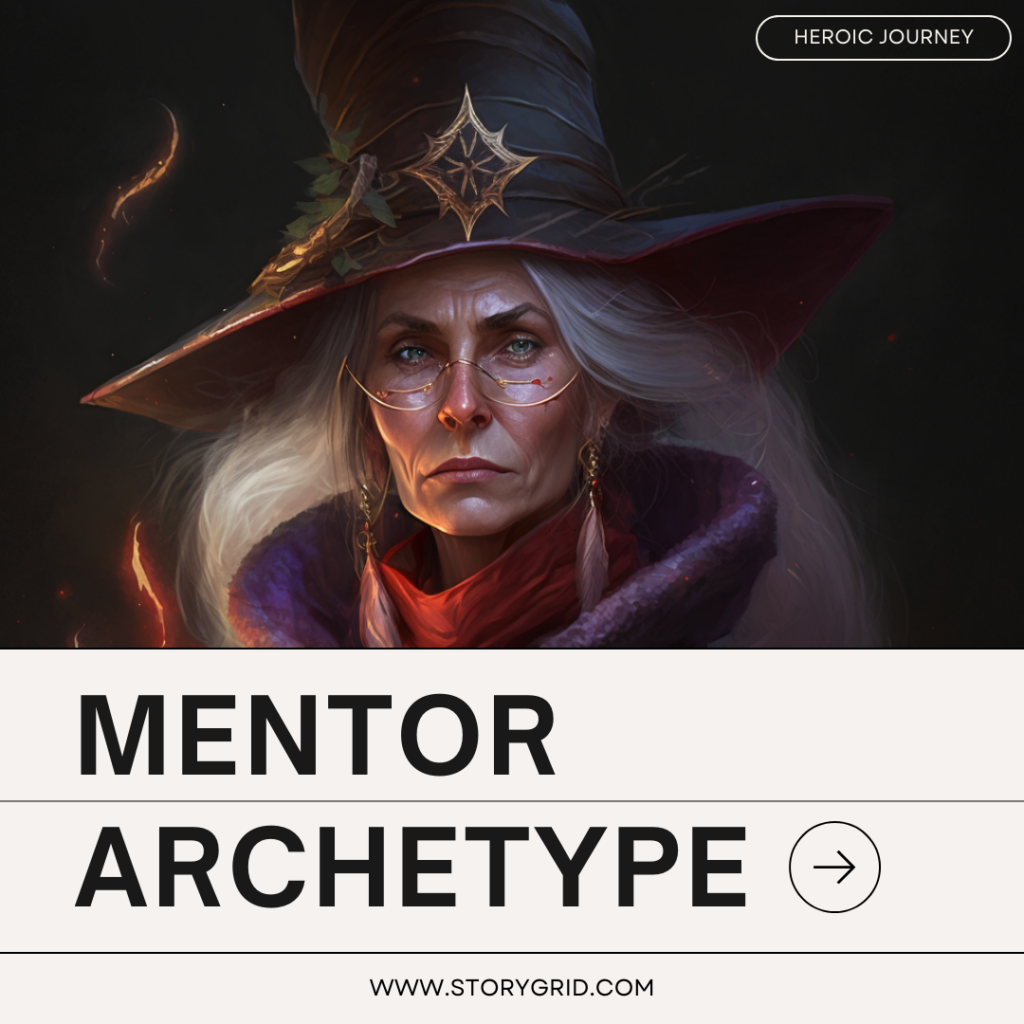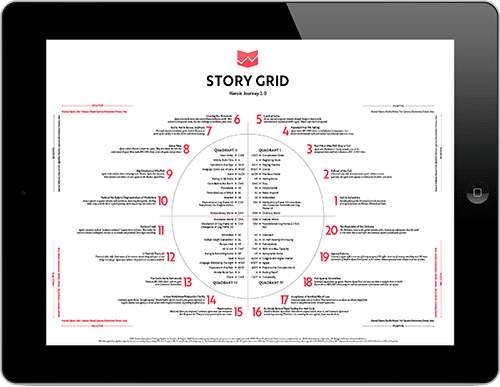👉 Write a book you're proud to publish 👈
The mentor archetype is a crucial element of storytelling. In literature and film, the mentor is the wise, experienced character who guides and trains the protagonist, providing them with valuable insights and knowledge to help them overcome challenges and achieve their goals. This archetype can be found in a wide range of stories, from classic myths and legends to modern blockbusters.
In this article, we will explore the mentor archetype in detail and provide 10 great examples of how it is used in storytelling.

What is the Mentor Archetype?
The mentor archetype is a character who serves as a guide, advisor, and teacher to the protagonist. The mentor possesses knowledge, skills, and experience that the protagonist lacks, and they help the protagonist to develop their own abilities and overcome obstacles. The mentor is often older and wiser than the protagonist, and they have typically already faced and conquered the challenges that the protagonist will encounter.
The mentor is an important figure in many cultures and is often associated with wisdom and guidance. In mythology, the mentor archetype is typically represented by an older, wise figure, such as Merlin in Arthurian legend or Chiron in Greek mythology. In literature and film, the mentor can take many forms, from a wise old sage to a tough drill sergeant.

Are you writing a Heroic Journey story?
Download our highly detailed infographic outlining the 20 major scenes you must have in every story.
Examples of the Mentor Archetype
1. Mr. Miyagi from The Karate Kid

In the classic 1980s film The Karate Kid, Mr. Miyagi is the mentor to the film’s protagonist, Daniel LaRusso. Mr. Miyagi is a wise and skilled martial artist who teaches Daniel the ways of karate and helps him to defend himself against bullies. He also provides Daniel with valuable life lessons about patience, perseverance, and inner strength.
2. Haymitch Abernathy from Suzanne Collins’s The Hunger Games

Haymitch Abernathy, the mentor to Katniss Everdeen in The Hunger Games series, is a complex and troubled character who provides Katniss with guidance and support as she competes in the brutal Hunger Games. Haymitch is a former victor of the games himself, and he understands the harsh realities of the competition better than anyone. He helps Katniss to develop her skills and strategy, and also provides support while she is in the arena.
3. Yoda from Star Wars

Yoda is another iconic mentor figure from the Star Wars franchise. Like Obi-Wan, he is a Jedi Master who trains young Jedi in the ways of the Force. Yoda is known for his wisdom and his unconventional teaching methods, and he provides Luke Skywalker with valuable guidance and training as he sets out to defeat the Galactic Empire.
4. Morpheus from The Matrix

In the sci-fi classic The Matrix, Morpheus serves as the mentor to Neo, the film’s protagonist. Morpheus is a wise and enigmatic figure who guides Neo as he learns about the true nature of reality and the role he must play in the fight against the machines. Morpheus teaches Neo about the power of the mind and helps him to develop his abilities as a fighter and a leader.
5. Professor X from Marvel’s X-Men

Professor Charles Xavier, also known as Professor X, is the mentor to the X-Men, a team of mutant superheroes who fight for justice and equality. Professor X is a powerful telepath who helps his students to develop their own unique powers and abilities. He also provides them with guidance and support as they navigate the challenges of being mutants in a world that fears and hates them.
6. Doc Brown from Back to the Future

In the classic 1980s film Back to the Future, Doc Brown serves as the mentor to Marty McFly, the film’s protagonist. Doc Brown is a brilliant inventor who helps Marty to travel through time and space in his iconic DeLorean car. He guides Marty as he tries to navigate the challenges of the past, present, and future.
7. Merlin in Arthurian Legends

Merlin is a wise wizard who serves as a mentor to King Arthur in the Arthurian legends. Merlin provides guidance, support, and magical powers to Arthur throughout his journey, helping him to become a great king and leader. Through his teachings, Merlin helps Arthur to learn important life lessons and become a better person.
8. Splinter from Teenage Mutant Ninja Turtles

Splinter teaches the four ninja turtles the art of ninjutsu and helps them to fight against their enemies. He guides them through the challenges of adolescence and encourages them to follow their own path, even when it differs from his own. Splinter provides unwavering support and encouragement to the turtles, helping them to become better versions of themselves and ultimately leading them to victory against their enemies.
9. Bagheera from The Jungle Book

Bagheera, a wise and protective panther, serves as a mentor archetype to Mowgli, the young boy raised by wolves in the jungle. He teaches Mowgli important life lessons such as survival skills, hunting techniques, and how to respect and understand the animals in the jungle. Bagheera also acts as a guide, leading Mowgli to safety and helping him to navigate the challenges he faces. Through his guidance and support, Bagheera helps Mowgli to become a more confident and capable individual, ultimately helping him to find his place in the world.
10. Socrates from Plato’s Dialogues

Socrates is a wise and insightful philosopher who embodies the mentor archetype in Plato’s Dialogues. He serves as a mentor to many of his students, guiding them on their journey to understanding and helping them to develop their critical thinking skills. Socrates is known for his questioning style of teaching, which challenges his students to think deeply about their beliefs and values. He is a patient and compassionate mentor, always willing to listen and offer guidance, but also willing to challenge his students when necessary.
How to Write a Mentor Archetype
1. Establish the Mentor’s Backstory
To create a great mentor archetype character, it’s important to establish their backstory. This will give the mentor depth and help the audience understand their motivations. You can explore the mentor’s past experiences, achievements, and struggles. Perhaps the mentor has had their own heroic journey, and they are now passing on their knowledge to the hero. Or, they may have suffered a loss or made a mistake in their past, and they are now seeking redemption by helping the hero. The mentor’s backstory should inform their actions and decisions throughout the story.
2. Give the Mentor Unique Personality Traits
A great mentor archetype character should have unique personality traits that make them stand out. They should have a distinct voice, mannerisms, and behaviors that differentiate them from other mentor characters. For example, a mentor may be wise, but they could also be gruff and tough-love, or they could be quirky and unconventional. These traits should align with the mentor’s backstory and serve a purpose in the story.
3. Make the Mentor Flawed
While the mentor is typically a wise and knowledgeable character, they should also have flaws and weaknesses. This makes them more relatable and human, and it can add depth to their character. The mentor could struggle with a personal issue or have a blind spot that affects their ability to help the hero. By giving the mentor flaws, you create an opportunity for growth and development throughout the story.
4. Establish the Mentor’s Personal Stake in the Protagonist’s Journey
To make the mentor’s role in the story more impactful, it’s important to establish their personal stake in the protagonist’s journey. This could be a sense of duty or responsibility, a desire to atone for past mistakes, or a personal connection to the hero. By giving the mentor a personal reason for helping the hero, you create a more meaningful relationship between the characters.
5. Make the Mentor’s Teachings Meaningful
The mentor’s teachings should be relevant and meaningful to the hero’s journey. They should help the hero to grow and overcome their challenges, and they should have a lasting impact on the hero’s character. The mentor’s teachings could include skills, knowledge, or wisdom that the hero lacks. They should also challenge the hero and push them out of their comfort zone.
6. Avoid Clichés and Stereotypes
When writing the mentor archetype character, it’s important to avoid clichés and stereotypes. The mentor should be a unique and complex character, not a one-dimensional caricature. Avoid using tropes like the “wise old man” or “magical creature” without adding a unique twist to them. Instead, consider how you can make your mentor stand out from other mentor characters in popular culture.
7. Consider the Mentor’s Relationship with the Hero
The mentor’s relationship with the hero is a crucial aspect of their character. This relationship should evolve and change over the course of the story. At the beginning, the mentor may be reluctant to help the hero or may have a different approach to teaching them. As the story progresses, the mentor should grow closer to the hero and become more invested in their success.
Final Word on the Mentor Archetype
The mentor archetype is a crucial element of storytelling. It is a character who serves as a guide, advisor, and teacher to the protagonist, providing them with valuable insights and knowledge to help them overcome challenges and achieve their goals. The mentor is an important figure in many cultures and is often associated with wisdom and guidance. In literature and film, the mentor can take many forms, from a wise old sage to a tough drill sergeant.
the mentor archetype is an essential element of storytelling, providing the protagonist with the guidance and support they need to succeed. By understanding and utilizing this archetype, writers can create compelling and memorable characters and stories that resonate with readers and audiences alike.
More Heroic Journey Resources